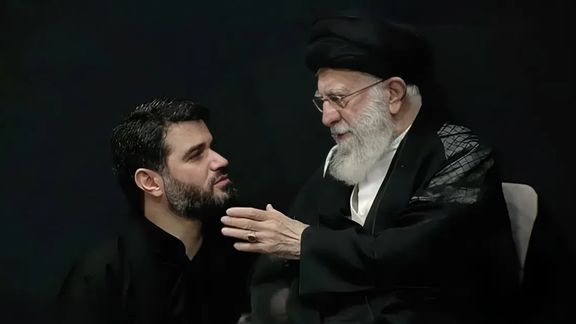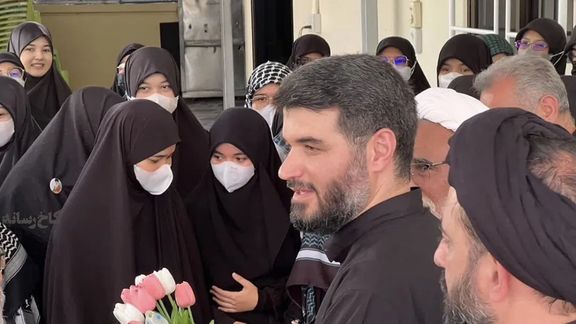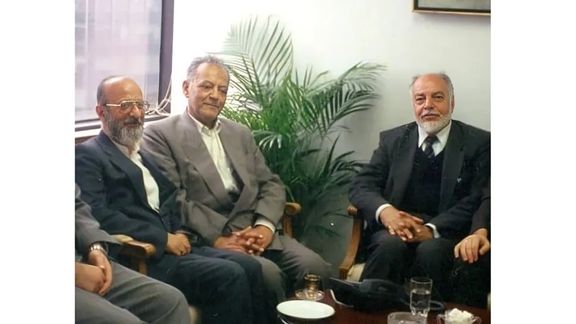Khamenei’s preacher travels to Thailand on propaganda mission

The eulogy reciter of Iran's Supreme Leader's office, Meysam Motiee, has traveled to Thailand in a bid to export the country's ideology abroad.

The eulogy reciter of Iran's Supreme Leader's office, Meysam Motiee, has traveled to Thailand in a bid to export the country's ideology abroad.
The trip, like many other initiatives by Iran’s clerical rulers, has stirred controversy and renewed criticism over the Islamic Republic’s efforts to expand its ideological influence abroad.
Motiee, seemingly a PhD holder and religious reciter, is celebrated by Khamenei as one of the system's "miracles," a symbol of how the revolution has penetrated the academic world, as Khamenei says. His close ties with the Supreme Leader's office have turned him into one of the most prominent figures used by the Islamic Republic to project its narrative, domestically and internationally.

While Iranian state-affiliated media tout Motiee's journey to Thailand as a cultural and religious mission, many see it as yet another example of the Islamic Republic’s broader strategy of exporting its ideology under the guise of religious outreach.
Iran has consistently dispatched thousands of missionaries and operatives to countries worldwide, in an ongoing effort to promote Shiism, and to bolster Tehran's political clout abroad.
Muslims are Thailand's largest minority, constituting around 12 percent of the 62.5 million population, though just one percent of them is Shia Muslim.
According to IranWire, Motiee rose to fame in 2017 when, during Eid al-Fitr prayers led by Khamenei in Tehran, he recited a poem sharply criticizing the nuclear deal and President Hassan Rouhani’s administration.
Despite backlash from Rouhani’s supporters, Khamenei himself publicly defended Motiee, further solidifying his status within the country's political system.
But Motiee’s influence extends far beyond Iran's borders. His eulogies have frequently aligned with Tehran’s political messaging, particularly in support of the "Axis of Resistance", the Tehran-backed network of militias and political groups across the Middle East. In his performances, he has repeatedly expressed opposition to Israel and Saudi Arabia, echoing the system’s aggressive foreign policy positions.
Under Khamenei's leadership, eulogists or "maddahs," who once earned their livelihood by performing lamentations for the deceased in graveyards or reciting tragic tales during Muharram, have now become key political figures in the Islamic Republic.
They hold significant influence in political circles and government offices, using their close ties to Khamenei to expedite various business matters, often for a fee.
During election seasons, eulogist associations engage in political propaganda on behalf of candidates, charging substantial sums. The closer a maddah is to Khamenei, the higher his fees and the greater his sway.
In 2005, a group of 100 maddahs endorsed Mahmoud Ahmadinejad for president.
Motiee’s trip to Thailand is far from unique. The Islamic Republic has long used religion as a tool to spread its influence globally. One of its most significant institutions in this endeavor is Al-Mustafa International University, a religious and educational center based in Qom.
Established under Khamenei’s orders in 2008, Al-Mustafa serves as an instrument in the ideological expansion. It operates in over 60 countries and receives significant funding from Iran’s budget, over $23 million in 2024 alone.
Despite claiming to be an academic institution, Al-Mustafa has been accused of serving as a base for the Quds Force, the overseas arm of the Islamic Revolutionary Guard Corps (IRGC).
With nearly 40,000 foreign students, many of whom hail from conflict-ridden regions like Afghanistan and Pakistan, the institution has played a key role in recruiting fighters for Tehran’s proxy wars.
The US government has sanctioned Al-Mustafa for its connections to Iran's military operations, yet it continues to operate globally, attracting students from over 130 countries, many of whom return home as loyal followers of Tehran’s ideological project.
In recent years, the Islamic Republic’s clerics, despite their anti-Western rhetoric, have shown a clear preference for international travel, often under the guise of religious outreach. Figures like Hamid Rasaee, a hardline cleric and MP close to the system, and the late cleric and Shia political theorist Taqi Mesbah Yazdi have made similar trips to Europe and even the United States.

The irony of these foreign trips is not lost on Iran’s beleaguered population. While the Islamic Republic continues to chant anti-Western slogans and promote isolationist policies, its officials travel freely, often to Western nations under the banner of promoting Shiism.
Meanwhile, the cost of these overseas missions is shouldered by the Iranian people, who have been hit dramatically by the country's economic crisis which has forced many below the poverty line.